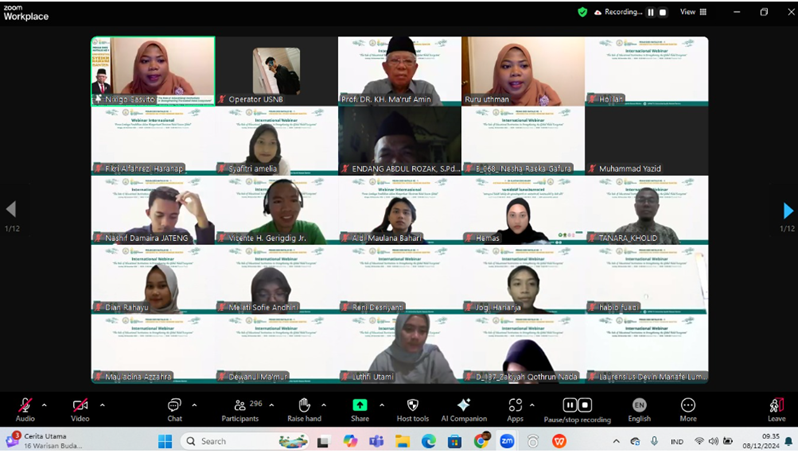Universitas Syeikh Nawawi Banten Successfully Hosts International Webinar

Banten – Universitas Syeikh Nawawi Banten (USNB) successfully held an international webinar online with the theme “The Role of Education Institutions in Strengthening the Global Halal Ecosystem” on Sunday, December 8, 2024.
This international webinar was organized to commemorate USNB’s first anniversary in 2024. The chosen theme is highly relevant, considering USNB’s role as an educational institution in contributing to the development of the global halal ecosystem.
“I warmly welcome and appreciate the organization of this international webinar as an effort to promote literacy and awareness of the halal industry, as well as to explore the positioning of higher education institutions in this global agenda,” said Indonesia’s 13th Vice President, Prof. Dr. KH. Ma’ruf Amin.
Also present at the webinar was USNB Rector Hj. Siti Haniatunnisa, S.H., M.H., LLB. In her remarks, she stated that educational institutions can serve as key drivers of the global halal ecosystem. Currently, 123 universities in Indonesia have established halal centers, and USNB is preparing to launch its own halal center in 2025.
Many countries recognize the growth potential of the halal industry, given its widespread use across various communities.
Prof. KH. Ma’ruf Amin added that global consumer spending in the halal sector is projected to reach US$3 trillion by 2025. This growth is driven by the increasing Muslim population, rising global awareness of halal lifestyles, and growing demand for products that are healthy, safe, and ethical.
“The development of halal products from year to year is very satisfying. It can expand internationally and has a significant impact on the halal industry,” said Dr. Winai Dahlan, Founder of The Halal Science Center at Chulalongkorn University, Thailand, as one of the keynote speakers.
The halal industry spans multiple sectors of daily life, including food, fashion, education, economics, beauty, and more. Its expansion signals a positive outlook for broader global adoption.
Dr. Ahmad Haikal Hasan, Head of the Halal Product Assurance Agency (BPJH), emphasized:
“Halal is not only for Muslims, but also for people of other religions.”
According to the Global Islamic Economy Indicator, Indonesia currently ranks third after Malaysia and Saudi Arabia. As one of the largest Muslim-majority countries, Indonesia has a significant opportunity to lead the development of the halal industry both nationally and internationally.
Another speaker, Prof. Mas’ud Said, Director of the Postgraduate Program at Unisma, outlined several roles that universities can play in this effort. These include establishing halal study centers, providing education on the prospects of the halal industry, conducting research on halal products, empowering students to become drivers of the halal industry, and promoting halal lifestyle awareness.
“I hope this seminar is not only a platform for knowledge sharing, but also the first step toward building collaboration between educational institutions, industry, and government,” said Reni Awaliyah, S.H., M.H., Head of the Sharia Economic Law Program at USNB.
